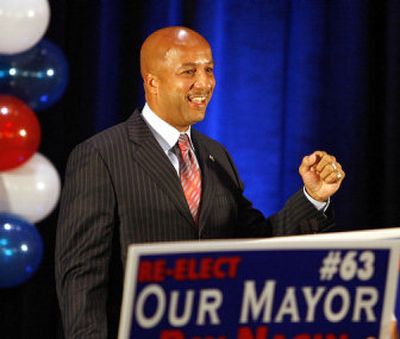New Orleans vote results in runoff

NEW ORLEANS – Mayor Ray Nagin and Lt. Gov. Mitch Landrieu will compete in a runoff next month following Saturday’s mayoral election, a tricky experiment of modern-day democracy that gave voters scattered by Hurricane Katrina a say in this city’s future.
With 94 percent of precincts reporting in the nonpartisan primary, Nagin topped all candidates with 38 percent or 30,260 votes but fell short of the majority he would have needed to win a second term and avoid the May 20 runoff.
Landrieu had 28 percent, or 22,073 votes. Nonprofit executive Ron Forman followed with 17 percent, 13,334 votes, and 19 other candidates trailed far behind.
In his late-night speech at his election headquarters, the glib Nagin took a jab at his critics who had counted him out because of his missteps during the Katrina crisis and for an outspokenness some saw as divisive.
“There have been too many people who said we were dead, too many people who said we were way too divisive. There were too many people who said this city should go in a different direction. But the people have said they like the direction,” Nagin said.
“We’ll no longer be a city of haves and have-nots,” he said. “This economic pie that is getting ready to explode before our eyes is going to be shared equally.”
Landrieu struck a similar theme, saying his showing was testament to the unity the city needs after a storm that put all of New Orleans “literally in the same boat.”
“Today in this great American city, African-American and white, Hispanic and Vietnamese, almost in equal measure, came forward to propel this campaign forward and loudly proclaim that we in New Orleans will be one people. We will speak with one voice and we will have one future,” he said, flanked by his father, Moon Landrieu, the last white mayor of New Orleans in the late 1970s.
Elections officials say the voting was steady and unusually problem-free. And while they didn’t immediately have complete numbers, the returns appeared low, roughly a third of those eligible.
Of the city’s 297,000 registered voters, tens of thousands are spread out across the United States. More than 20,000 cast ballots early by mail, fax or at satellite voting stations around the state, and thousands more made their way to 76 improvised polling stations. Some traveled by bus or in car caravans from such evacuee havens as Houston, Dallas and Atlanta.
“Let me tell you something. This is an important election,” said Gerald Miller, a 61-year-old stroke patient whose daughter was pushing her in a wheelchair. “We’re going to straighten this mess out.”
Around the city, a mixture of black and white voters were seen moving steadily in and out of the “super polling places” that stood for the dozens of wrecked schools and churches where residents would ordinarily have voted.
“It means a lot because whoever gets elected is going to help us rebuild,” said 57-year-old Lorraine Payton. “This is about trying to save us right now.”
The winner of the mayoral and city council races will face a host of politically sticky and racially charged decisions about where and what to rebuild in a city where whole neighborhoods remain uninhabitable.
Four-fifths of the city was flooded, and large parts of New Orleans are still woeful tracts of ruin. Rebuilding plans – and the federal money to pay for them – are being debated. Nearly all the public schools remain closed, and the tourism business, long the economy’s mainstay, has drawn few conventions.
Nagin said at a precinct in his neighborhood Saturday that, with another hurricane season just weeks away, this is no time for a transition of administrations. “We don’t have a year to wait,” he said.
The 49-year-old former cable television executive became known in the immediate aftermath of Katrina for sometimes shaky leadership and frequent off-the-cuff remarks, such as when he cursed the sluggish federal response and later suggested that God wanted New Orleans to remain a “chocolate” city. Nagin, who is black, stood by the comment and later said he was convinced the black vote was “coalescing” around him.